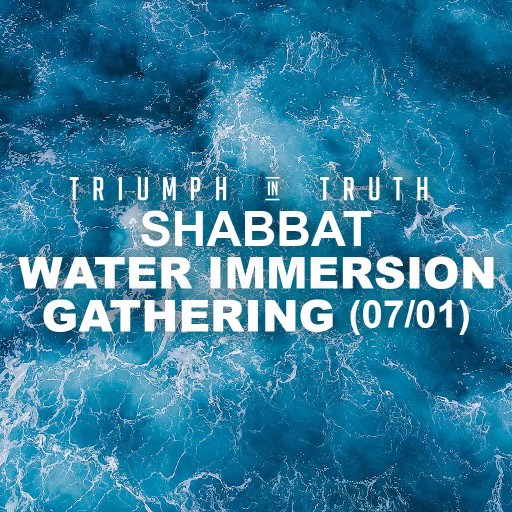Watch
Events
Articles
Market
More
Today's Sabbath post inspired by Luke 4:40-42
When the sun was setting, all those who had any that were sick with various diseases brought them to Him; and He laid His hands on every one of them and healed them. And demons also came out of many, crying out and saying, “You are the Messiah, the Son of Elohim!” And He, rebuking them, did not allow them to speak, for they knew that He was the Messiah. Shabbat Shalom.
#shabbatshalom #shabbatrest #torah #messianic #god




Good Night Torah Crew! Unless you're Rhy Bezuidenhout in which case Good Morning!



Thought for Today: Shabbat July 01:
From the heart of Elohiym comes the strongest rhythm – the rhythm of love. Without His love reverberating in us, whatever we do will come across like a noisy gong or a clanging symbol. And so the work of the human heart, it seems to me, is to listen for that music and pick up on its rhythms.



Shalom!
YAH willing, Triumph In Truth will be hosting an outdoor Shabbat
Water-immersion Gathering at 10 am this coming Shabbat (07/01) at:
Crissie Caughlin Park
3415 Idlewood Dr
Reno, NV
89509
You are welcome to call a member of the team at 423-457-0899 if you
need directions or have any questions
Thank you for carefully reading the following information as all the
details are important.
Here's a list of things to bring:
* Lawn chair
* Water
* Bible
* Pen and paper
We have water immersion robes to wear over your clothes and appreciate
everyone adhering to the following:
* Men wear jeans or other long pants (Men will be immersed in their long pants)
* Women wear a long (non-transparent) skirt and a shirt that doesn't
cling or become translucent when wet or a dress of similar sort
* A towel
* A change of clothes if you don't want to travel wet
Triumph In Truth encourages biblical modesty (Deuteronomy 22:5,
1Corinthians 11:5), however there is no harsh, judgmental attitude. We
will be publicly praying during our immersions, so the ministry has
available brand new (never been used) bandanas for head-coverings for
the women (1 Corinthians 11:2-16). If you have your own, that's fine
as well. We are returning to the ancient (biblical) paths, so modesty
is very important.
As for doctrine, G. Steven Simons does not embrace Greek or western
philosophy or quote Roman bishops to determine his understanding of
Elohim. He believes what Yeshua taught in John 17:3, "And this is
everlasting life, that they should know You, the only true Elohim
(speaking of the Father), and Yeshua Messiah (the anointed One) whom
You have sent." He believes in Elohim (the Father), the Creator of
heaven and earth, and the Son of Elohim (Yeshua), the Mediator between
Elohim and men, the man Yeshua Messiah - conceived through the spirit
of YAH, born of a virgin, and filled with the FULL measure of the
spirit of YAH. He also believes that the Father places His set-apart
spirit (breath, wind, ruach) within those who believe in His Son
Yeshua and ask to be filled. At the immersion you will be calling on
YAH (the Father) to forgive your sins in the Name of Yeshua Messiah as
in the book of Acts.
Be praying and prepare your heart for a powerful, transformative experience.
Yours for the Reign,
Triumph in Truth




Shabbat Shalom, everyone! May your day of rest be blessed! https://davidwilber.com/



